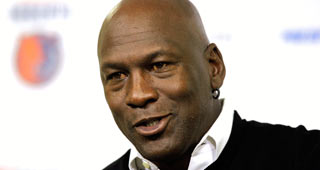On Sunday, the NBA's owners voted to approve the transfer of the Charlotte Hornets from Michael Jordan to two finance dudes with names that sound like and are perhaps exactly Gabe Plotkin and Rick Schnall. Whether this is a notable development in the course of the franchise remains to be seen. Bold new visions will be delineated, a subtly different shade of paint will be applied to everything, and then we'll spend the next five years figuring out if it something actually happened. The end of Jordan's reign is the story here. It is the definite thing.
Jordan's soon-concluding ownership of the Hornets has the quality of post-WWII American misadventure, a beast having consumed and excreted the apocalypse, wandering indifferently and destructively. Getting tanked at the 19th hole. Chewing out Malik Monk at the tail end of a December win over Detroit. "Scouting" as watching the last few rounds of the NCAA tournament. Launching a tequila line with Jeanie Buss and Wyc Grousbeck because all the most meaningful moments in life have already past, and you are doing things to do them, attaching your name to events in hopes that one of them will register as such. This is a guy who once sent a press release that hit like a song of the summer.
In MJ's thirteen years at the helm, the Hornets were never particularly good but worse than that—very un-Jordan—they were irrelevant. They lacked starpower, were studied and admired solely by League Pass-trawling nerds. We couldn't get our hackles up about Charlotte wasting Kemba Walker's career. Kemba Walker was precisely the caliber of player who fit there. Good, fearless, but who the hell cares. Steve Clifford was that same sort of coach, and still is. It's a historical anomaly that he ever wasn't coaching the Hornets. You imagine an old couple separating, discovering nothing new or welcoming out in the broader world, and moving back in together, defeating both total isolation and the possibility of change.
None of this affects Jordan's legacy because our affection for him, or maybe the stark disparity between his scorching 90s peak and everything that followed—permanently discolored eyes and puffiness, jeans you could drape a fumigated manse with—won't let us perceive a unified whole. It's likely Jordan thinks of himself this way too. He seemed to regard the Hornets as a kind of investment or endorsement deal, lending your clout to a line a workout equipment you don't use. Certainly, if Michael Jordan had truly conceived of the Charlotte Hornets as a basketball team—hear in your mind, the force with which Jordan says "the game of basketball," like catechism in the mouth of a saint—then they might not have been good but they would have been much different. Watching them would have felt like coming to the threshold of a locked room that's on fire. As it was, if you're living outside the Charlotte metro area, you probably didn't watch Jordan's Hornets much. He did so under obligation, and to be close to the court, lingering in the front yard of his spiritual home.
Chalking up the absurd profit of the Hornets' sale—something like $2.7 billion—as yet another Jordan W would be a mischaracterization. He's simply won the way anyone with the necessary resources and relationships could have, the way that hedge funders and cruise ship magnates and loan sharks have won in the NBA, through the inexorable growth of the league, its capitalization of everything except Steph Curry's mortal soul. Jordan will take the scratch, but businessman triumphs are beneath him.
You could describe this point in time as Jordan becoming finally unmoored from the NBA, with which you assume he'll settle into a casual, aloof, spotted-at-All-Star-Weekend kind of relationship, but really, the Hornets barely constituted an attachment. The NBA to which Jordan belonged—defined, in a major sense—passed into history when he retired the second time. On the Wizards, Jordan was a figurehead in an era that belonged to Shaq and AI, and this current, fully post-playing version has been both a certifier of and (more often) a foil to LeBron and his contemporaries. Even LeBron is old now, though determination hasn't yet left him. David Stern has been dead for three-and-a-half years, and 1992 returns to us only in increasingly degraded iterations: mummified senators clinging to power, Al Michaels reading Night Court reboot promos.
Unless we are Saul Bellow typing, or Sam Cooke at the microphone, our relationship to greatness is always tangential. We thrill at it, speculate on its dimensions. How it must feel. On some level, even as we express appreciation, we are profoundly jealous of it. I wish I could do that.What's depressing or a little bit heartening, depending of how miserable you are, is the fact, inevitably laid bare over a long enough period of time, that the person who seems to possess greatness is merely channeling it temporarily. They lose the genius, the muse, the ability, the drive. Tragedy dismantles them, or time degrades them. They wash out. They die. And then their relationship to greatness, which was never really theirs, or at any rate no longer resides in them, becomes tangential too. That's what I think about when I think of Michael Jordan, the guy whose three billion dollar sale of the Charlotte Hornets was approved by a room full of crisp blue oxfords on Sunday afternoon. The beautiful winner, who melted the league with his rage and talent: that is somebody else. Of course he lives eternally.



